|
Posted by Romy the Cat on
04-21-2007
|
 ml8 wrote: ml8 wrote: | | So sometimes i just wonder why do you need 6C33C at all, with your high-sensitive speakers. |
|
This thread is a derivation of the “5 Channel Version of Melquiades” thread:
http://www.GoodSoundClub.com/TreeItem.aspx?PostID=4063
Following numerous signs and leads I decided to try how one stage Melquiades might behave. I converted my failed headphone amp into one stage Milq. It took less then 2 hours: to toss the 6C19P, put in the Melquiades driver and to reset bias and plate voltages.
I decided to go for 6E6P just because I am lazy and the 6C19P and 6E6P have virtually identical pins layout. I drive 6E6P-DR at ~7.1W (42mA and 167V) with Amorphous Lanhdale LL 1623 transformer of 50mA/60H connected 17:1
The amp after the first re-assembly worked perfectly: both channels have identical current and identical gain. The amp drove 95dB monitors, sure with no juice, no dumping and no volume. I connected the amp for a very short time for Macondo: the volume was more then fine; in fact I would say 6-8dB louder then with Super Melquiades – enough gain! No noise, no freakishness during start and fade, no ferrite bids and no oscillations… Very nice, indeed!
The biggest question would be how good the Sound would be. I did not listen it and decided to let it burn over night and to listen it over weekend. It will be very interesting journey… Rgs,
Romy the Cat
|
|
|
|
Posted by ml8 on
04-21-2007
|
Personally i'm not very big fan of single-stage amplifiers, cause i always found sound of two-stage SE much more balanced.
But maybe that's just my dumb speakers, who knows...
Would be nice to hear about your experience.
|
|
|
|
Posted by Romy the Cat on
04-21-2007
|
|
Yes, I ma very enthusiastic to see what resume I will get. I would not use a single-stage amplifiers with low sensitively speaker. Low sensitively speaker and high sensitively speakers are different school of thinking in term of amplification. They have different demands for power supply and different amplifier compliance (and I do not mean just dumpling)…. I have a feeling that amplifier for high sensitively is like walking a slippery, covered in ice slope. Any rough move leads to undesirable consequences…
Anyhow, I concluded that I drove the 6E6P-DR too hard and now I am at 30mA, 180V. The B+ is SS, fast-0soft switching, LCRC filtered. It will be fun to listen the thing today.
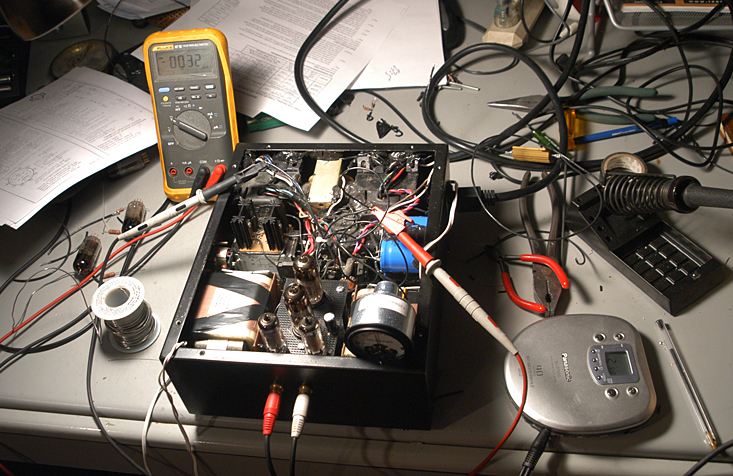
BTW, I would like to personally express my gratitude to you. Over the years Dima and I were thinking about those experiments but your post was the actual trigger the made me to reconsider it again and try it…
Also, since you drive then “naked” then may I ask you how the 6E6P/6E5P dies if they have no second stage. I mean if I load them to the HF driver with line level filter then do they do HF “pops” when they are ready to go south?
Also, Dima, since I have multiple, sections on the Lanhdale secedes keeps pushing me to try the ultraliner version of a single-stage Milq… I will probably will… if the 6E6P/6E5P will sound itself more or less usable…. The caT
|
|
|
|
Posted by Romy the Cat on
04-22-2007
|
|
I put the Super Milq and the new one-stage Milq today and was playing them together in order to see which would be more interesting. It is imposable to “compare” as is the upper bass and lover mid channels as the Super Milq has all kind of line level filers built in. Then only channels that very intentionally free from any filtration in the Super Milq is HF channel I was able to play Vitavox S2 in it’s 400Hz horn with 1000Hz filter driven in absolutely identical condition with both amps: HF channels if Super Milq and the one-stage Milq (when I talk in this post about Super Milq I mean the HF channel of Super Milq)
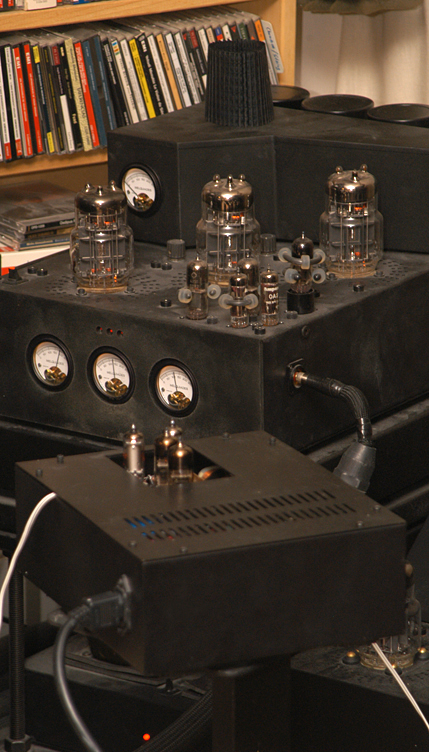
I would preserve my final judgement for later (there are reasons) but the initials impression is very much unexpected. I was predicted everything but not what I got.
So, currently the one-stage Milq has 1.33dB higher gain then Super Milq and equalizing the volumes I learned that the sound was VIRTUALLY IDENTICAL. In fact to my surprise I was VERY impressed (and completely did not expect) with the transparency of the Melquiades output stage. It hard to judge it neutrality as it is over 1kHz sound and it is possible to do only just the “technical listening”.
Anyhow, the preliminary result is that HF Super Milq and the new one-stage Milq sound the same. There is some minor and near negligible difference but to assess this “difference” it I need to do something… I will repost it later…
So fat – a big surprise to me… Hm, if the damn stage around 6C33C is so transparent then it would be a good idea…. to make a line level preamp around it…. Rgs,
Romy the caT
|
|
|
|
Posted by Romy the Cat on
04-22-2007
|
|
Well,
I spent today a number of hours trying to advance my observations regarding abilities of the one-stage Melquiades. It was quite interesting. Thankfully the electivity today was way better during the second part of day. I loaded the 6E6P heavier (it has a “fascinating” reaction to plate loading) and…. eventually I was able to found a configuration where I do feel that one-stage Melquiades performed better then MF and HF channels of the Super Melquiades. I have to note that the DIFFERENCES ARE MANOR but they are notable.
The one-stage Melquiades in comparing to two-stage Melquiades has:
1) Less granularity of sounds
2) Better ability to care stress, it less “confusing” during crescendos and those chorus' mess
3) "Cleaner" highest frequencies
4) Some sense of more advanced refinement and delicacy
5) Less tackiness
6) Less syntactic upper mid range.
Once again: those advantages are VERY-VERY minor but they are there. I DO feel that the amplitude of those advantages, regardless not low they are is a reasonable incentive to pursue a single-stage Melquiades with high sensitivity. I do recommend to the folks who have near 110dB sensitive speakers and who do not have a huge room to pay attention to those observations, I will. I do not know at this point if I go for it but to make a 4-chennal single-stage Melquiades will be remarkable simple. Well, perhaps to have juts a single resistor and a “smart” tube in a signal pass does matter….
Once again, my applauds to the 6E6P/6E5P… Rgs,
Romy the Cat
|
|
|
|
Posted by ml8 on
04-23-2007
|
Sorry Romy, i can't tell you about life longevity of 6E5P in my amp 'cause i'm not using them there anymore 
For my speakers two-stage SE sounded much nicer, more balanced and clear with more volume. Well at least it was easy to predict, considering 88 dB sensitivity. Anyhow, that amp was re-assembled as two-stage with 6P1P in output.
But still, during my experiments in my STSE-amp I have found some interesting things.
First was that zero biasing that i've already mentinoned. It changes sound of different tubes in very different way -- with grid currents some are absolutely unlistenable, rest ones are more or less sounding the same, and only few -- sounds VERY different, but in much BETTER way. Better so far that i'm thinking 'bout whole amp with zero bias in all stages. 
This few tubes was 6E5P, 6S45P (which i've found a little better for my single-stage amp that 6E5P) and... perfectly god-like sounding (output beam tetrode) 6P6S!!! Triode-connected, for sure. Absolutely the MOST clear sounding driver, and i believe there is something magical in it's sound cause i can't describe it with words -- it just THAT sound and thats it. Much more... should i say, inspiring? -- than anything else i've heared at driver stage.
Pity this way 6P6S has low amplification factor. I think i will use it with interstage transformer or adone choke to get more output, and then to drive another 6P6S in output stage... BTW, tube with close specs, 6F6P (output pentode) didn't sound even remotely as well as 6P6S; actually it sounds horrible in this mode.
And about that your findings -- very interesting.
You see, i'm always struggling to find sound without that damn granularity in it, but so far i did not succeeded. 
Only few of my amps (DHT with kenotron rectifier) were almost free of granularity, but still they all have other flaws and i took them apart for later projects. Still i don't know exactly WHY they was sounding so smooth -- is it DHT, or kenotron, or something else?..
|
|
|
|
Posted by Romy the Cat on
04-23-2007
|
|
Well, the more I think about it then more I realized that I would like to try it. I’m contemplating to make 5-6 channels on single-stage Milq: 4 channels for each Macondo channel and 1-2 reserved for any perspective lower bass channel or for perspective 6E5P paralleling for bass horns. The more I think about it the more I realizing how easy it would be. Another very motivating for me factor is that is that if I go for it I was thinking to build-in the single-stage Milq inside my speaker frame…. It would be very interesting solution with virtually no speaker wires and direct coupled drivers.
Also, ml8, since for 30mA I have enough core mass in the Amorphous Lundahs to get any gap and any inductance then I am considering what would be the optimum gapfor OPT. Currently I use Lundahl LL1623 in “D” configuration, 50mA at 60H in primary. I was considering keeping it for upper bass channel (with single tube) and for higher frequency channel to go for 40-50mA but for much less core mass and much less turns (inductance). I will not buy transforms for reserved channels of course and will keep the 5th or perhaps 6th channels only as a placeholder.
The fun part is that the more I think about that 6 channels on single-stage Milq (with no bass channel) the more I realize how simple it might be… It I design a good layout for building it in my Macondo then it might take literally one day to put it all together… Rgs,
Romy the caT
|
|
|
|
Posted by Romy the Cat on
04-24-2007
|
 ml8 wrote: ml8 wrote: | | You see, i'm always struggling to find sound without that damn granularity in it, but so far i did not succeeded. Only few of my amps (DHT with kenotron rectifier) were almost free of granularity, but still they all have other flaws and i took them apart for later projects. Still i don't know exactly WHY they was sounding so smooth -- is it DHT, or kenotron, or something else? |
|
Actually granularity was never a subject of my frustration. I do not think that granularity or it’s lock important itself but rather it is important in context of everything else, like harmonic signature of amp and many other aspects… Else, there is granularity and there is graininess…
I very much do not feel that finer granularity and more refine graininess are unconditionally better. Most of the OTL beat anything else in graininess and granularity but most OTL are hardly useable with conventional speakers because other sonic facts of OTLs. Generally fewer capacitors have very positive effect to granularity, and type of PS and…. God know what else…
BTW, admitting that single-stage Milq has better granularity characteristics I do not automatically claim that it is better version then a two-stage Milq. You see a full range Milq was tested musically and was exposed to very ruthless assessment of it musical neutrality and many other factors. The single-stage Milq did not go over it as I used the single-stage Milq so far only as dedicated amp for a number of single band-pass channels. I did invested some time and effort to assure that the given channels driver by full Milq and the single-stage Milq has the identical harmonic structure (30mA at 16R into ~3000R). However, it is not the assurance that the 4 channels, operating full (over 100Hz) range will not have the problems of some others low granularity amplifiers…
The caT
|
|
|
|
Posted by Romy the Cat on
04-24-2007
|
|
I did an interesting experiment today trying to learn if those Melquiades driver tubes have even gain. The Russian tubes are notorious to have very widely spreading specification, so….
I took 14 6E6P. Some of then were new, some used and some violently used. I stack them one by one into the single-stage Melq, drove it with 100Hz loaded to 12R and measured with my db meter the differences between each tube. To my satisfaction only one of the tubes had after 10 min of burning .25dB difference in gain. It is 1/4db among the 14 tubes… VERY NICE.
This is very good sign an after the 6C33C it sounds like a blessing….
Now are the problems. To my great dissatisfaction Lundahl does not has the transformers that I need. I might used some of the amorphous Lundahl transforms but it for HF channels will not be an ultimate solution. Not to mention that sine I will be building in the single-stage Melquiades INSIDE the Macondo frame the side is matter and for the given project the overly-large Lundahl core is not a virtue. (Lundahl does not do low impedance small transformers) I will summarize my install draft what I might need, perhaps someone would point me to an interesting direction.
So, the single-stage Melquiades will need the following transformers: (all channels will drive 30mA and all transformers are 12-13 to 1)
1) 100-500Hz channel high-passed at 50Hz: amorphous core 100-120mA (with possible double tubing), with relatively high primary inductance. I migh use Lundahl 1623A.
2) 500-1000Hz channel band-passed at line-level, amorphous, with moderate primary inductance. I migh use Lundahl 1623A with 200-250mA gap but I would prefers to have 50-60mA with less core mass.
3) 1000-1200Hz channel operating full range, amorphous, with low turns on primary and good size core to be able to care full range though the amplifier. I should be gaped for 50-60mA. I have no prospects at this point.
4) 12500Hz and up channel operating high-passed at 12500Hz, amorphous or powder (or air?) very small core, with ultra low turns on primary. I should be gaped for 35-40mA. I have no prospects at this point. Rgs,
Romy the Cat
|
|
|
|
Posted by be on
04-25-2007
|
ml8 wrote:
"This few tubes was 6E5P, 6S45P (which i've found a little better for my single-stage amp that 6E5P) and... perfectly god-like sounding (output beam tetrode) 6P6S!!! Triode-connected, for sure. Absolutely the MOST clear sounding driver, and i believe there is something magical in it's sound cause i can't describe it with words -- it just THAT sound and thats it. Much more... should i say, inspiring? -- than anything else i've heared at driver stage."
ml8, could you tell what voltage and anode load you used the 6s45p without bias? What about grid stopper, etc.?
|
|
|
|
Posted by Romy the Cat on
04-25-2007
|
|
And email from a site’s visitor:….
“And for my full-range Melquiades, should I still try and build the original version or wait to see result of what you are working on now?”
This is a complicated question about 2-stage Melquiades vs. single-stage Milq. Both amps have the same sound. It was said before many time that the sound of Melquiades derive from driver stage not from out stage. Dima has built in past a few renditions of Milq with different output stages, including GM 70 and SS and he reports the all amps sound in the same way. Still, will a single stage Milq preserve all qualities of the tested 2-stage Melquiades. I do not know the answer at this point. There are some minor advantages in the way how the single-stage Milq produces the sounds but I have no references about Sound of the single-stage Milq. Once again: the Sounds vs. Sound – the very big difference. Since the single-stage Milq will be DSET by nature it’s final sound might be asses only in contexts of Macondo tuned for the capacity of the given DSET (and vise versa). I do not have this experience at this point. I am wiling to try if I find the right transformers for HF channels.
Some other considerations for people who might look at the direction of single-stage Milq.
Look at the driver of your upper bass horn and make sure that you will have enough power, gain, dumping … and juice to drive this channel with single-stage or with single-stage with parallel tubes if necessary. Another thing is power. With single-stage Milq you get whatever you get power-vice and it is it. There is no room for maneuvers of any kind. If you have the same sensitively channels then you can’t for instance decrease plate loading for a selected channel as you will loose gain. With 2-stage Melquiades you can more idle the tube and more open up the input voltage divider but with single-stage Milq it is not the option as the channels amplifier the full grid throttle. Also, if you consider a single-stage Milq then watch the room size. In my room single-stage Milq has enough gain to drive the Macondo loud enough. Should I have 3 times larges room then I do not know that it would be the case, most likely not…
I think if I had problems with room size and if I had a preamp with gain then I would be able to get 6-10 more dB from preamp. However, I do not know if the single-stage Milq would have enough power to care more grid current. If someone is interested I might make some measurement of the single-stage Milq, it would not be difficult… To be continuing….
Romy the caT
|
|
|
|
Posted by ml8 on
04-25-2007
|
 be wrote: be wrote: |
ml8, could you tell what voltage and anode load you used the 6s45p without bias? What about grid stopper, etc.?
|
|
Kinda of 100-110 V on a plate. I didn't measure current cause by looking at curves i was confident that i'm not overpowering tube (working point for zero bias and 100 V on a plate is way below maximum plate dissipation curve).
I'm not using grid stoppers cause they have negative impact on sound and there was no problems with parasitic oscillations.
Grid leak resistor value was 470K.
|
|
|
|
Posted by be on
04-25-2007
|
Thanks ml8, do you know how much it could swing before problems, either due to clipping or grid current?
Rgds.
be
|
|
|
|
Posted by Romy the Cat on
04-25-2007
|
 be wrote: be wrote: | | Thanks ml8, do you know how much it could swing before problems, either due to clipping or grid current? |
|
I would be interesting to know how much plate voltage (and power) 6E5P would have with no bias. If ml8 would promise to try the Milq’s biasing then I will promise to try the no-bias operation :-)…
Surely I would not have in the no-bias operation a power necessary for LF channels but for the HF channels might do it…. if it sound in the same way as the LF channels. I wonder how difference is in sonic signature of 6E5P when Milq’s biasing is being use vs. the use of no-biasing? It is very much possible that they will have different sounds, which would make the stages unintegrateable in context of DSET application… The Milq’s biased 6E5P sounds VERY different then a regularly fixed-biased or cathode biased 6E5P. Ml8 suggests that a drastic change on sound character happens with 6E5P with no bias as well…. It would be interring to try it and to see in which direction the tube goes…. BTW, ml8 did you try driving more current thought anode and getting more power while you were in 0-bias mode? Rgs,
The Cat
|
|
|
|
Posted by RonyWeissman on
04-25-2007
|
Hi romy, thanks for info. I am going to stick with the 2-stage plan then as it will not be DSET but full range and my mid-bass is somewhat barbaric at this point. I have found someone to build for me, though we have not discussed fees yet. I'll probably be using the Tribute transformer as well.
R Weissman
|
|
|
|
Posted by Romy the Cat on
04-25-2007
|
 RonyWeissman wrote: RonyWeissman wrote: | | Hi romy, thanks for info. I am going to stick with the 2-stage plan then as it will not be DSET but full range and my mid-bass is somewhat barbaric at this point. I have found someone to build for me, though we have not discussed fees yet. I'll probably be using the Tribute transformer as well. |
|
Yes, sure, if I go a full range amp then I would defiantly stick with 2 stages version. The single-stage is in away too radically-specific way to go and I am not convinced at this point that it is a wining way to. A single stage has very limited scope of applications - a two stage Milq would make way more universal amp. There is NO HUGE difference between in sound of 2 stages and one stage, the difference does exist but it is way less than I would initially expected…
One of the many incentives for me to try a single stage because the single stage has no excessive power. You see, I for instance would like to couple the voice coils of my drivers to the secondary of my amps, implementing all filters at line level. Currently I split filters doing some at speaker level and some at line level. I can not drive with my 6C33C channel directly my compression drivers because the 6C33C has too much power and because the 6C33C might become violent when it dies. With the sub 2W of 6E5P I am planning to couple the transformers to the drivers and it might be interesting. There are some other reasons: the MF high-pass mystery that I never was able to resolve and few other thighs….
Still, doing whatever crazy and Macondo-dedicated things I will be doing with one stage I will have my full-range Milq as a tested reference trying to get result no worse then the one that I got from a “default” Melquiades ….
Rgs,
Romy the Cat
|
|
|
|
Posted by Romy the Cat on
04-25-2007
|
|
Well, it defiantly is not a full range amp and I see that at 100Hz it has already some issues (it is with 6oH primary). I drove it with 3V and the scope is set at 1V per division, the load is 12R. It gives some idea bout the power of this thing… Interesting that drive into distortion the amps does not flat-clip as two stage Milq but rather it creates a smooth and round clip…
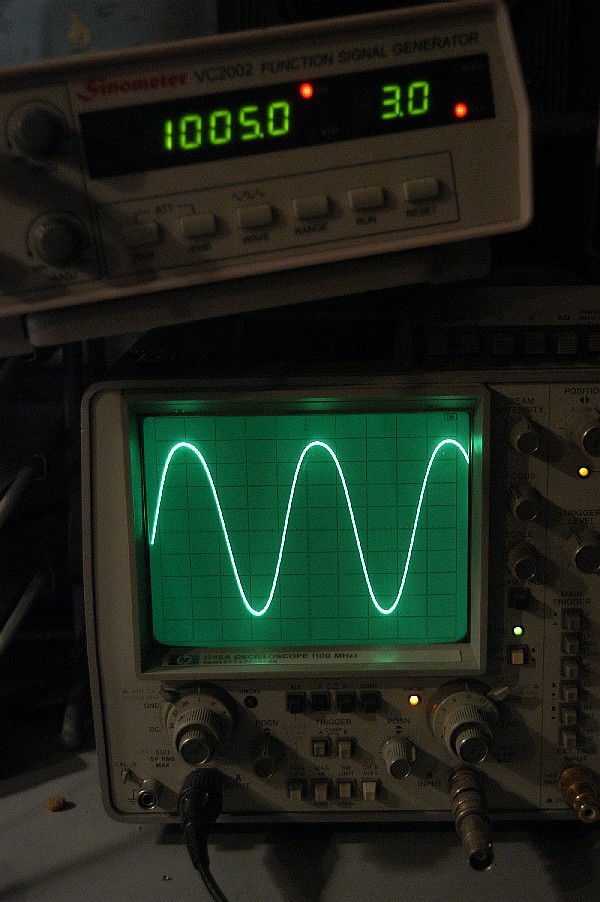
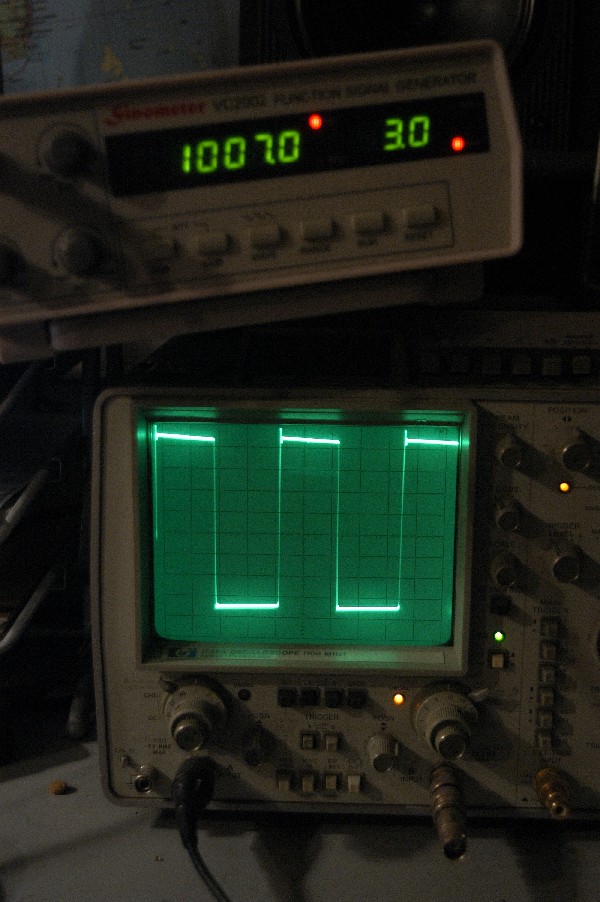
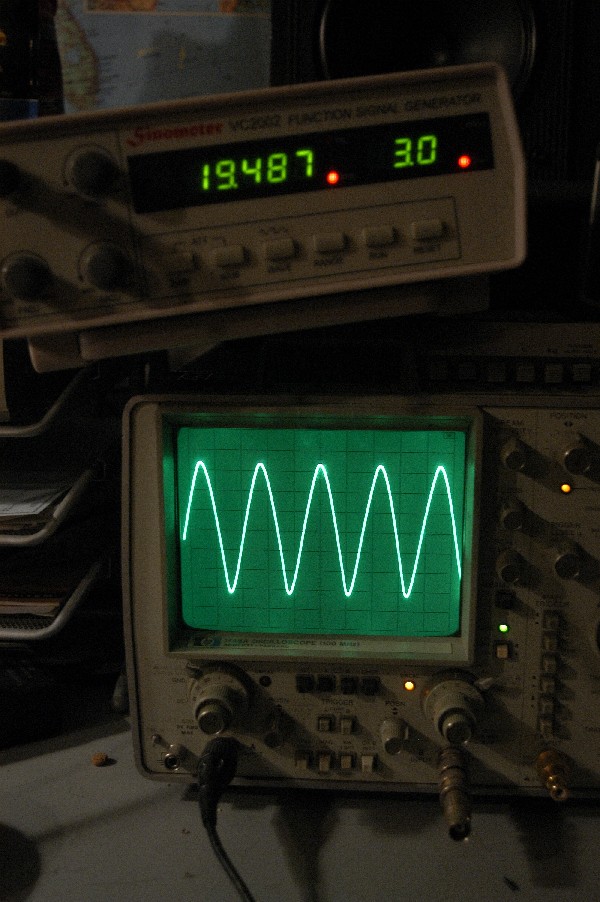
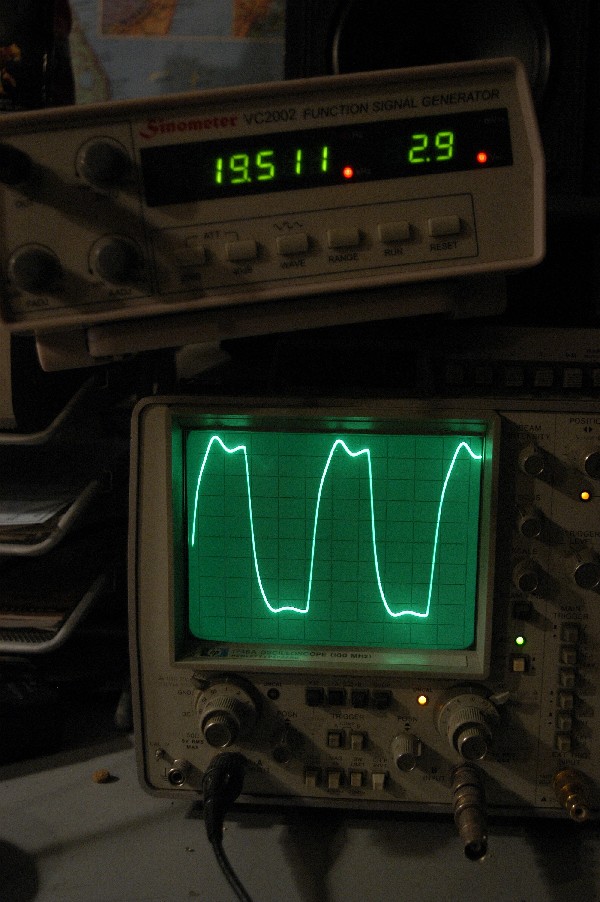
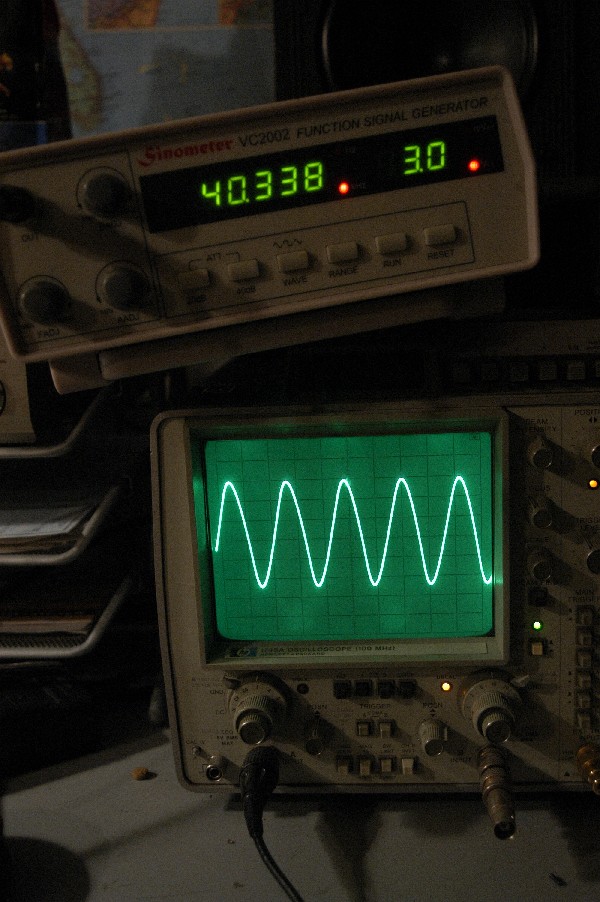
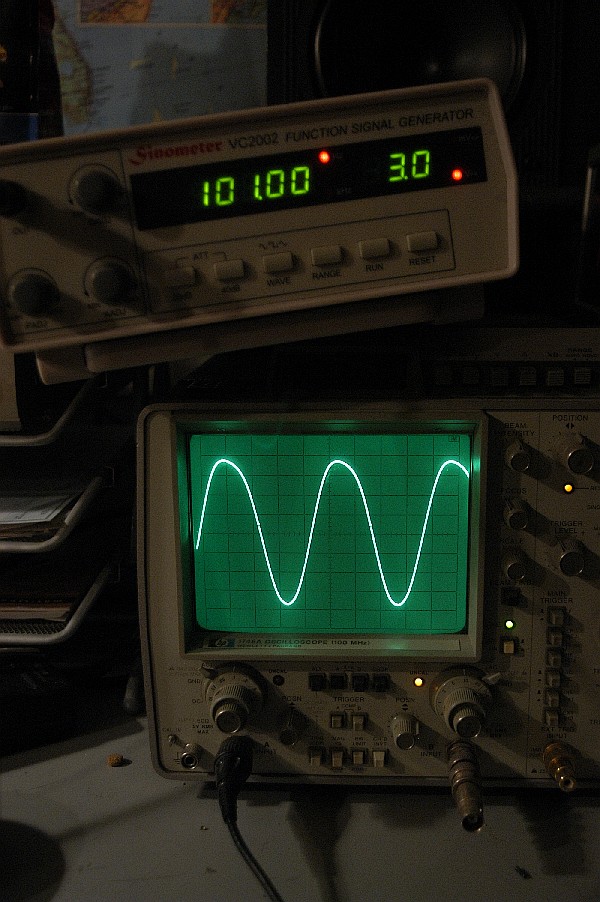
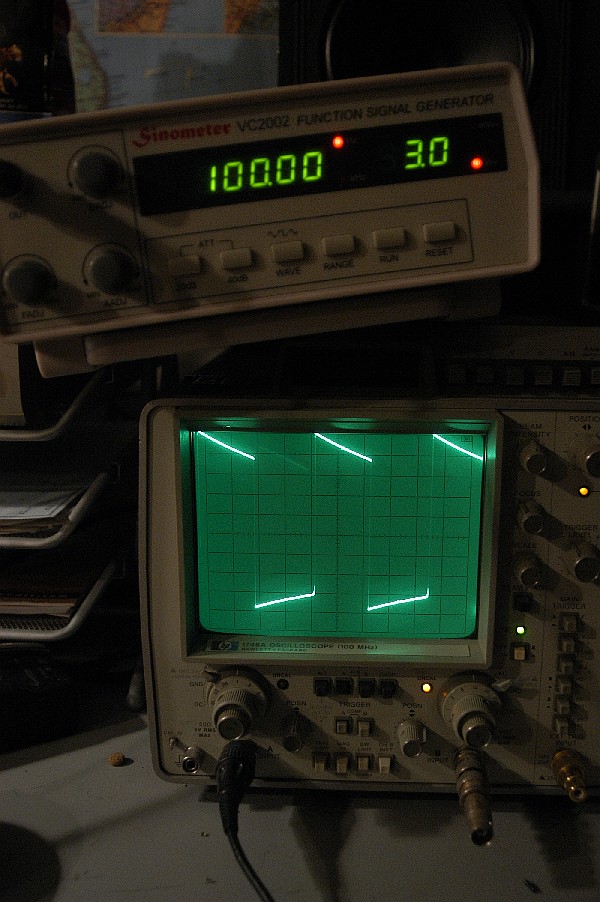
|
|
|
|
Posted by Paul S on
04-25-2007
|
I think some of the best horns I ever heard were reconstructed "theater" speakers that had their amps wired directly to the voice coils, just as you describe, above. This was my first notion of the term "dedicated amp", because of this experience. It may be that the amps in this case were PP, and almost certainly they were 2-stage, although I can't be certain this many years later. In any case these amp/speakers projected remarkable vitality and immediacy, with very limited resonances for horns of that type, although I have no idea why this would be so, just an observation.
Best regards,
Paul S
|
|
|
|
Posted by Romy the Cat on
04-26-2007
|
 Paul S wrote: Paul S wrote: | | I think some of the best horns I ever heard were reconstructed "theater" speakers that had their amps wired directly to the voice coils, just as you describe, above. This was my first notion of the term "dedicated amp", because of this experience. It may be that the amps in this case were PP, and almost certainly they were 2-stage, although I can't be certain this many years later. In any case these amp/speakers projected remarkable vitality and immediacy, with very limited resonances for horns of that type, although I have no idea why this would be so, just an observation. |
|
Actually the "theater" speakers were VERY far from the “best horns” and their amps, mostly 3 stages and up, were quite poor as well. I do not share your view that a "dedicated amp" should be coupled to directly to the voice coil. A dedicates concept in SET world is an optimization of circuit and output transformer for the given frequency range and to the given load. Anyhow, the "contemporary" horns are capable to through way more interning and demanding sound then those "theater" speakers… I do not say that voice coils coupling is bad but I say that juts the fact of direct coupling itself if not as the detail that automatically assume anything.
Rgs, Romy
|
|
|
|
Posted by Paul S on
04-26-2007
|
Well, it is a given that I am not a horn guy right now to begin with. Of course, the "theater speakers" were and are mostly dinosaurs and/or mostly of historical/nostalgic interest. I just want to mention some exceptional qualities I noted - incidentally - with the "hard-wired" format, namely "aliveness", "immediacy" and less of the sorts of resonances I had heard from other horns/drivers of similar design with similar separate amps. No doubt the amps and speakers both could be done better today, and my observations were/are a long way from "controlled". I still wonder about the hard-wired approach and what, if any, particular effects this in and of itself actually has on such sensitive and particular speakers. I am following your progress on this front with great interest.
Best regards,
Paul S
|
|
|
|
Posted by Romy the Cat on
04-26-2007
|
 Romy the Cat wrote: Romy the Cat wrote: | | Still, doing whatever crazy and Macondo-dedicated things I will be doing with one stage I will have my full-range Milq as a tested reference trying to get result no worse then the one that I got from a “default” Melquiades … |
|
The last deep nigh after midnight I was comfortably sitting with my Cat on my couch playing 1938 Bruno Walter with Wiener Philharmonic recording of Mahler IX and Handel’s Messiah by Swedish Radio with Stockholm Bach Chorus. The Macondo both channels were done more or less properly calibrated and were driven by my 3-chenals Super Milq…
It was quite serious, rich and meaningful Sound the Sound the ignited within me lethargy to destroy the Super Milq, pulling form it the MF output transformer for the single-stage Melquiades. The Sound was so balanced and so “compiled” that to take it apart would be an act of real barbarianism. Frankly speaking I was so comfortable and so contented that I was wondering if I even what to go for the single-stage Melq… Sure it might be interesting to try to see what would happen but it would open a Pandora box for many other prospective “issues”.
It is quote nice as it with no extra efforts invested… I do not know… I will not hurry this case…. If someone make for me the necessary uncompromised MF and HF output transformers then I would make the single-stage Melq. If not then I will keep what I have now and will keep bitching that the world is the place filled with mean and non-cooperative people….
Ah, how wonderful would be if I could write a check to someone and that someone would bring the build amp in my room in a few weeks/month…
The Cat….
|
|
|
|
Posted by Romy the Cat on
04-26-2007
|
|
The maximum power I can get as now from the single-stage Milq is at 3.4V, not at 3.0 and it is still well under one watt. I think I would need a little more to get some pick power. I need to play a little more with 6E5P’s operation point to find it’s best current/voltage ratio for the single-stage operation and to get a little more power However, at this point I notice one very interesting thing that differentiate it form Milq. When I drove Milq with excessive grid current into deep distortions the amp near horizontally clipped the summit of the waves. The single-stage Milq when it severely overpowered clips very … I would say differently on the scope. It is very round and smooth… Well you watch yourself. The fist one at 3.4V is the last none distorted value…
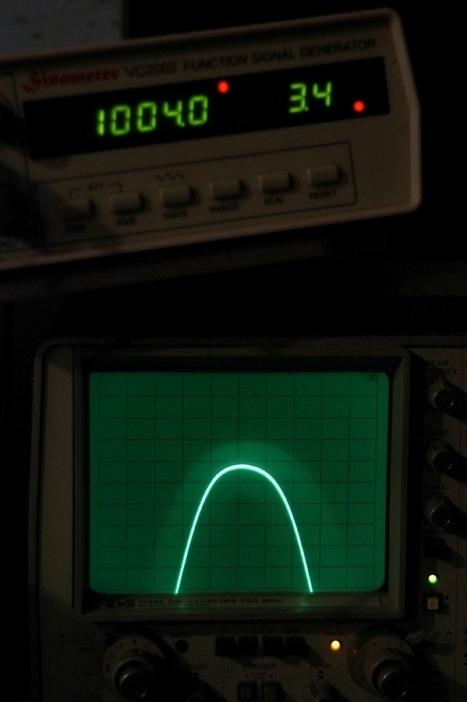
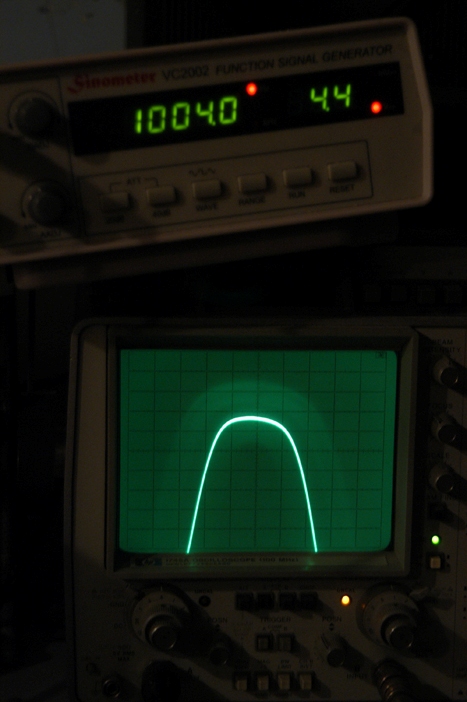
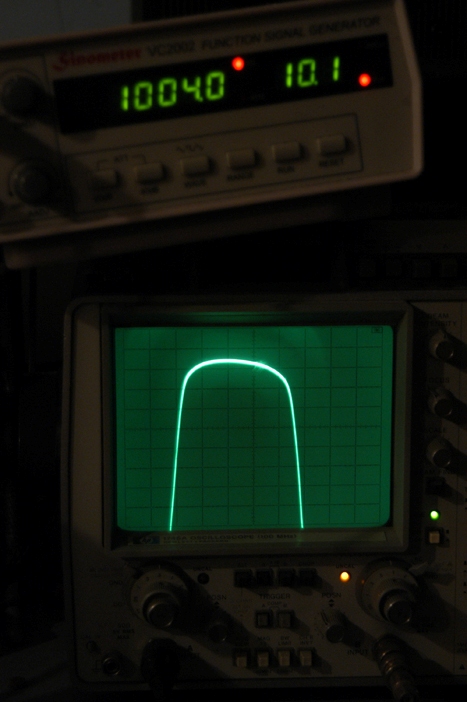
|
|
|
|
Posted by Romy the Cat on
04-27-2007
|
Dima and I spent today quite a time experimenting with different operation of the Single-stage Milq. We drove it from my Fluke 409D with resistor bias, loaded with 12.8:1 into 12R.
Playing with bias, voltage and current we tried to find an operation with reasonable power, to have identical current and voltage clipping and absolutely symmetrical (V vs. A) halves of the wave. In the end we concluded that with my 15-16Ohm the 170-200V and 30-40mA is near ultimate operation (for single stage). We were able to get whole 2Watts with very sympatric V vs. A clipping. Probably in my case I will stay with 1.6-1.7W..
I also, tried the Zero base operation as ML8 suggested. Sure, I lost a lot of power and the amp began to operate in very severs voltage deficiency. Here is 4V overload with 115V on plate:
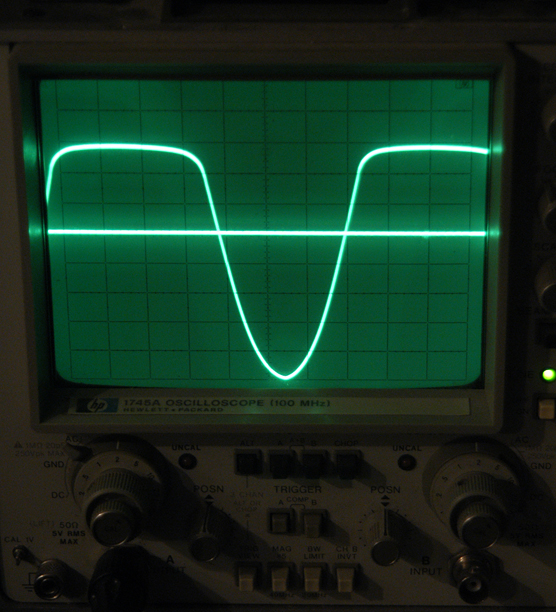
Another interesting test: trying to bypass the resistor between plate and screen. I was not able to detect with my scope any oscillation but I have a slow scope – juts 100MHz. hat I detected that with moving my heads neat the tubes and stressing the tubes the plate current was fluctuating within 3-4mA. With 4R resistor between plate and screen the problem did not manifest itself and the tube had a complete immunity to it’s environment. Over the weekend I will be loading the thing to the real drivers, find the V vs. A against the real load and listen the Sound...
|
|
|
|
Posted by Romy the Cat on
04-28-2007
|
|
Now I re-listen all the things the we try to measure. To surmised everything I have to tell that Dima’s way to looks for optimum operation point of the tube (setting balance for voltage vs. current sufficiency) turned out to be very successful as I did not see absolutely no discrepancies between auditable and measurable. As long the tube has the identical and symmetric current and voltage clipping it does sound the best. I have no idea why audio people create so much “cult” about finding the best operation points for tubes and why any controversy exist – it look so simple and so unambiguous – for one stage of course.
Anyhow, I was not able to listen the Single-stage 6E5P with horns. The tolerable volume level I got driving Vitavox with 0.6-0.7V… VERY far from any dangers regions. So, I took 16R speaker with 90dB sensitivity and drove it with Single-stage 6E5P. First - the 0 bias on the tube – it was absolutely unusable, sorry ml8…
The best sound I got from this tube with ~ 6.5-6.8W dissipated on plate. More power made the sound more stiff less power made… less power…Now current vs. voltage (with 16R load) keeping the same power. More voltage and less current made Sound “brown”, more compressed and in a way “inverted”. More current and less voltage made it sound suffocated. In a way deficiently in voltage or current both produced that over- damping effect at upper bass and lower midrange but that over-damping sounded different for voltage and different for current. It is have to explain in words but it is VERY much the same as over-damping of bass when we adjust VTA of cartridge vs. lighting of bass when we change the tracking mass.
Ironically the best subjective sound I got in the best measurable point. I did a few blind tests with different tubes when I was trying to set subjectively the best sound adjusting bias without looking at miliampermeter of the plate current. In all cases, finding this operations point and then driving the amp into distortions I has the perfect symmetrical pictures of voltage vs. current. It all was at the same current but at different bias settings (from minis 3.1V to minis 3.8V). So, the “magic” number was 175V and 38mA…
Now is the quandary… Do I have to for the Single-stage Milq pre-select the tubes or I need to put bias adjustment in there? Perhaps only for upperbass channel where I “might” be important. Now is the biggest question: now important all of this? All those experiments took place with amp outputting 3V but during it live the Single-stage Milq will do less then 1V. I do not have a full range 109dB system to assess subjectively how will sound. Listening single channels I can say that the deviation form perfect voltage vs. current setting is WAY less (if any) auditable at 0.7V. So, I need to think how important it might be in the real world.
The caT
|
|
|
|
Posted by Romy the Cat on
04-29-2007
|
|
Jim, returning back to the subject of tube testing….
I do not know if you have seen my most recent obsession; the idea of driving my Macondo with 1.8W of a single 6E5P:
http://www.goodsoundclub.com/LatestPosts.aspx?ThreadID=4241
So, what I learned is that all 6E5P, regardless of vintage and lever of being used up have the same 30 times gain. So, it is a drastic improvement over the very uneven gain of 6C33C. Still, all 6E5P have different ability to produce current – the stupid Russian tubes! So, sine I know the exact operation point for this tube and sine I will have the adjustable base for each channels of the single stage Melquiades then what might OBJECTIVELY indicated to me the life span of the 6E5P? The cathode emission? The transconductance? The use of getter? The darkening of the glass? Where would be an objectively correct point when a tube consider “gone”: 10% less of cathode emission, 30% less of cathode emission, 50% less of cathode emission? Is it wary from tube to tube and some of the sound fine with 50% less of cathode emission and with less bias? Rgs,
The Cat
|
|